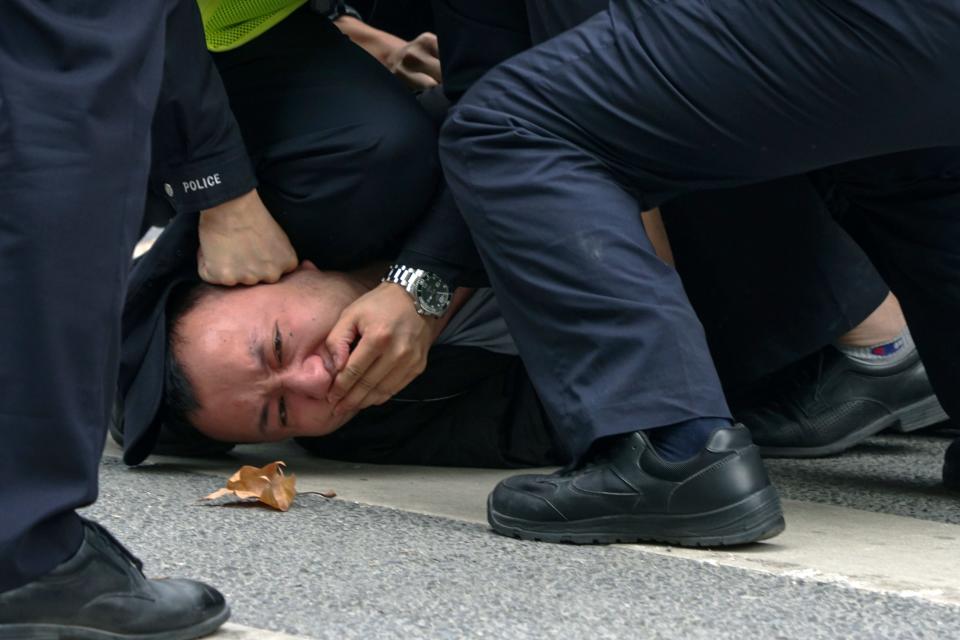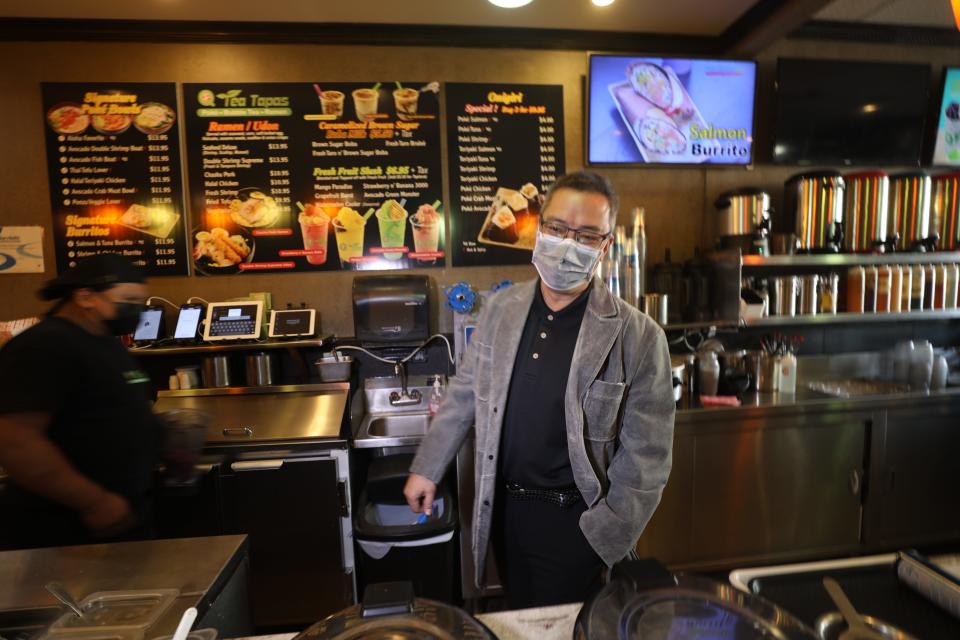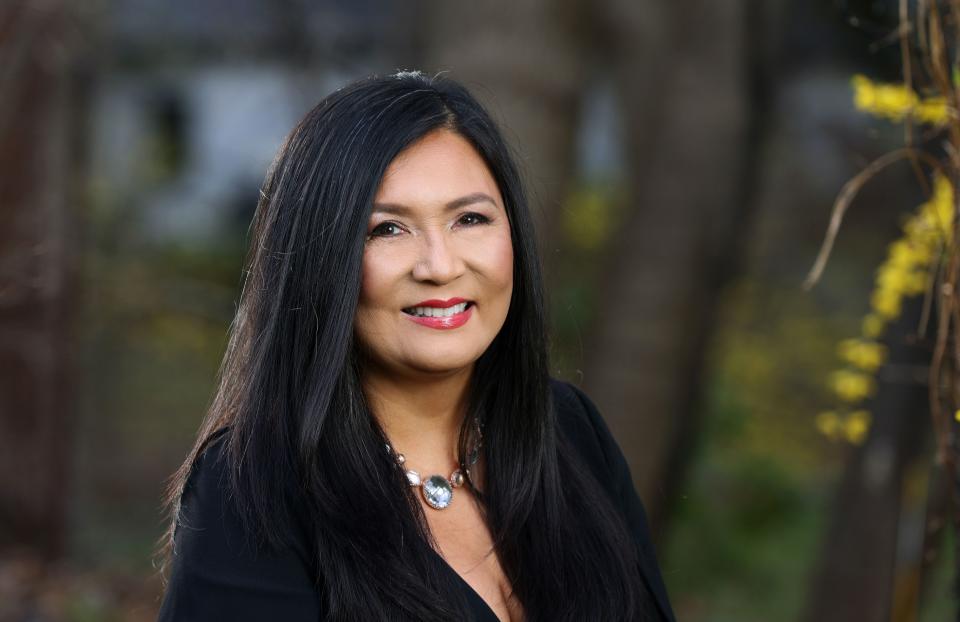As unrest spirals in China over 'zero-COVID' policies, these Chinese Americans in NJ worry
- Oops!Something went wrong.Please try again later.
Racked with worry, Amy, a Fort Lee resident, kept a close eye Monday on the protests that have erupted in China over that nation's zero-tolerance COVID policies.
Those demonstrations followed a fire in Urumqi, the capital of the Xinjiang region in China's west, in which 10 people died. The blaze was blamed by many witnesses on strict COVID-19 restrictions that prevented residents of a large apartment building from safely evacuating.
Amy — who did not share her last name out of fear for the safety of her family still living in China — watched closely as demonstrations erupted across that nation in a rare act of defiance against the ruling Communist Party. When we spoke Monday, Amy was monitoring the Chinese-language WeChat social media platform while trying to keep in regular contact with her relatives living in China's Fujian province.

"Friends and family feel helpless even as they disagree with the policies," Amy said, explaining that many of her relatives are concerned about hard-line COVID-19 restrictions. "They are worried about safety of protesters and that they would be met by violence by the officials."
In cities across China, thousands protested over the weekend and into Monday against COVID-19 restrictions enacted and enforced by President Xi Jinping and his regime. The demonstrations are rare because China does not tolerate dissent in the same manner as Western countries — so rare, in fact, that many compared them to the Tiananmen Square protests of 1989.
Related coverage from USA TODAY:Protesters angry at China's lockdowns call for Xi to resign; crowds clash with police in Shanghai
Asians in greater New York:How did trendy boba tea become a symbol for liberal, upper-class Asians? | Mary Chao
On WeChat, Chinese citizens are sharing details with the wider Chinese diaspora about their frustrations with quarantines, their discontent over the ever-changing COVID-19 restrictions, and their fatigue and annoyance — especially with daily testing, Amy said.
Others also noted challenges for Chinese Americans who seek to reunite with their families in the coming months — as well as exasperation. Many are also frustrated by Chinese policies that stand in stark contrast to an apparent international post-pandemic reality with fewer public health restrictions. The ongoing World Cup soccer tournament in Qatar, which is happening with few, if any, restrictions, is fueling Chinese frustration, too.
New Jersey Chinese Americans are keeping in touch with relatives during these uncertain times through WeChat, texts and emails. More than 110,000 people identify as Chinese in the Garden State. The Chinese American community has Jersey bulwarks in places like Fort Lee, Parsippany and Edison. Asian Americans are the fastest-growing group in the state, accounting for 10% of New Jersey's 9 million-plus population, according to 2020 census. New Jersey has the fifth-largest population of Chinese Americans — behind only California, New York, Hawaii and Texas.
Echoes of Tiananmen
Not since the Tiananmen protests of 1989 have so many Chinese risked arrest and personal safety to protest government policies. Now almost three years into the pandemic, China remains in near-lockdown mode as its citizens cope with the economic and mental health effects.
"China itself is taking a dramatic approach," said Demarest resident David Weng, 55. "People have bills to pay."
Weng immigrated to the United States 40 years ago from Hong Kong. His family hails from Fujian province — and he still has cousins living there. Although the United States enacted fiscal stimulus plans to help its citizens financially during COVID lockdowns, China has not done so, Weng said. It's difficult to survive financially with the restrictions, he said.

Even as the protests means losing face for Xi — a devastating turn for the Chinese president — the protesters are highly unlikely to topple him. Xi has control of the Communist Party and China's military, said Albert Chin, president of the Chinese Community Center of New Jersey, which is based in Glen Rock.
"Finally, people are realizing this control is not right," said Chin, 74, of Paramus. "Three years of COVID and people are sick of it."
Chin is an American-born Chinese without close relatives in China, but he has been watching the protests closely, worried that the government may crack down on the protesters.
Chin recalled the Tiananmen Square moment, during which protests and demonstrations erupted in June 1989.
The demonstrations came to a crescendo on June 4, 1989, after the Chinese government cracked down on protesters and dispatched tanks to break their ranks. College students and others in China called for political and economic reform during those protests. More than 30 years later, there are still no official estimates on the number of deaths in the crackdown, which are thought to be between several hundred and thousands.
The Chinese government does not tolerate dissent, Weng said. The ruling party exercises full control over its people. Weng hopes the party will negotiate and relax its rules somewhat.
"It's not right that the government has so much control over the people," Weng said.
Mary Chao covers the Asian communities and real estate of North Jersey.
Email: mchao@northjersey.com

This article originally appeared on NorthJersey.com: Zero-COVID China: NJ Chinese Americans worry

